WHERE WOULD JESUS BANK?
by
Catherine Austin Fitts
July 4th, 2004 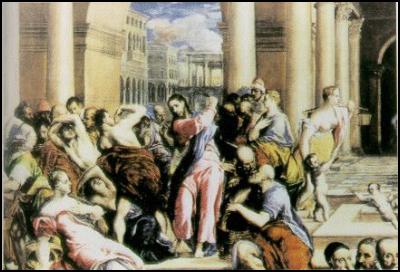
El Greco – Jesus and the Money Changers
“And Jesus went into the temple and began to cast
out them that sold and bought in the temple, and
overthrew the tables of the money changers”
-- Mark 11:15I think of Jesus as a real deal, straight up kind of guy who always cared deeply about his fellow man. That's why we often ask “What would Jesus do?” when looking for the action of highest integrity.[1]
Jesus and the Bankers
Jesus acted with ferocious and bold integrity when he threw the money changers out of the temple. Needless to say, he hiccuped their cash flows on what otherwise would have been a big grossing day. Their business model threatened, the priests who managed the money changers insisted that the Romans crucify Jesus. The Romans tried to pawn the problem off on the local king, Herod, who ducked and sent Jesus back to the Romans. The Romans, still looking for a way out, tried a flogging. That did not work. The priests meanwhile had succeeded in persuading the crowd to support them and scapegoat Jesus. Thirsting for a crucifixion, the crowd voted to set the criminal Barabbas free instead of Jesus.
Jesus died because the crowd voted for the criminal enterprise. The crowd voted for the priests and their rich endowments and their alliance with the money changers. The crowd did not ask “Cui Bono?” which is Latin for “who benefits?” If they had, they would have seen the real deal on who was making money on the death of Jesus and voted with their conscience, and for their own best interests instead.
It's 2000 Years Later and We're Still Voting for the Criminals
Looking around today, it would appear that more than two thousand years later our popular vote is still backing an unholy alliance of “priests” and their rich endowments,[2] “money changers” (now called central bankers), criminal enterprises[3] and the continuous growth of dirty money, market manipulation and warfare.
The 1990s was a period in which the illumination of the dirty money in American politics and business really came out of the closet. The stories of the 1980s Iran Contra period financial fraud and of government conspiring with private industry in illegal weapons deals and drug trafficking to fund a secret government became widely known, starting with Senate hearings that were broadcast world wide. National Security Council involvement during the 1980s exploded onto the Internet with the “Dark Alliance” series published in the San Jose Mercury News in 1996 and tales of Bush and Clinton involvement in the illegal arms-trafficking and cocaine transshipment operation in Mena, Arkansas.[4] Stories proliferated about dirty dealings by member banks of the New York Federal Reserve (the US Treasury depository) with the Arkansas state agency that distributed housing subsidies and issued housing bonds and that was alleged to have been laundering the local share of the profits.
Although the mainstream media, led by The New York Times and The Los Angeles Times, attempted to discredit them, several fearless news sources kept the Dark Alliance and Mena stories alive. Two CIA Inspector General reports essentially confirmed the credibility of the Internet press which continued to cover the story.[5] These Inspector General reports included a memorandum of understanding between the CIA and the US Department of Justice (“DOJ”) that relieved the CIA of any obligation to report illegal activities, including narcotics trafficking by non-employee agents and contractors of the CIA.
Since that time, I have had the opportunity -- as an investment banker and former Assistant Secretary of Housing responsible under both Bush I and Clinton Administration for the cleanup of some of the S&L, mortgage and real estate related fraud and money-laundering schemes -- to learn more about the black budget business model used in these criminal enterprises.[6] Simply put, we are living in a negative return on investment economy. This means that from the point of view of most people on the planet, the dolphins, the trees and all living things, the world is worse off for our centralized human economic activity, at the crux of which are the central banks and the military-industrial complex they finance.
The good news is that we have the power to transform this economy. This power comes in the form of each and every dime we spend in the marketplace.
Who Will Push the Red Button?
In 2000, I made a presentation on the subject of “dirty money” to a wonderful group of about 100 people gathered outside of Philadelphia to affirm and explore their commitment to the spiritual evolution of our culture. During my talk, after walking the group through an analysis of the enormous profits generated by narcotics trafficking, financial fraud and other types of organized crime, as well as the reinvestment of this money in the stock market and campaign war chests, I asked the members what would happen to the stock market if we decriminalized or legalized drugs and thus seriously adversely affected the narco profiteering business.
The stock market would crash, they responded.
What would happen to the government's ability to borrow more money to finance the deficit if we enforced all money-laundering laws and, as a result, $500 billion to $1 trillion of annual laundered funds no longer moved through the US banking system?
If the government could not finance its operations by borrowing money at low cost, their taxes might go up. Worse yet, their government checks might stop as government program expenditures were cut, they said.
I then asked them to imagine a big red button at the front of the lectern. By the power of their imaginations, if they pushed that button they could stop all organized crime and money laundering in the United States.
Who would push the button?
Only one person in that audience of 100 people committed to spiritually evolve our society said they would push the button.
Upon reflection, 99 would not. I asked why. They said that if they pushed the button, the value of their mutual funds would go down, their taxes would go up and their government checks might stop.
I commented that what they were proposing was that an entire infrastructure of people continue to market hard narcotics to their children and grandchildren to maintain the value of their mutual and pension funds.
They said, yes, that was right.
Such popular support for cheap financing from dirty money goes well beyond this candid audience. Indeed, most of us are party to maintaining this negative ROI economy.
The future of our democratic freedoms depends on our adopting financially responsible and profitable strategies to collectively “push the red button” in a way that makes our world better instead of worse. Such strategies do exist. These are actions we can take immediately both individually and collectively at the grassroots. Are you ready to push the red button?
The process for individuals starts with adopting a personal intention to transform our world. We have the power to take personal responsibility to learn how the money works in our neighborhoods and our lives and workplaces, and then take steps to cleanse the money in our control. In short, it's time to electrify the power of our intention with the power of our transactions.
Each dime we spend is a “vote” in the marketplace. We can vote with the temple priests or we can vote with our consciences for leaders and businesses that demonstrate through their daily transactions and decisions that they truly care. What an enormous opportunity we have, if each one of us will switch our votes. After several thousand years, there is no time like the present to start voting for ourselves and our planet instead of with the money changers and temple priests that feed at their monetary and lending troughs.
Who's Who in Stealing Our Money
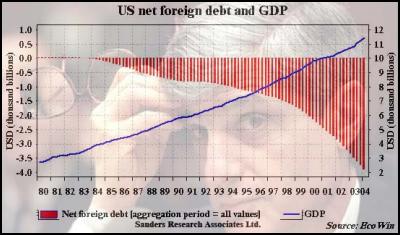
Click for big version
As privatisation has increased, so has debt. The taxpayer gets the liabilities, and Bob & Co. get the assets (Bob Rubin is former Treasury Secretary, now co-head of CitiGroup).
Great work if you can get it!
- Image SandersResearch.Com Before we choose which banking and other financial institutions to vote for, let’s take a quick look at the candidates.
Increasingly, our US government assets are being transferred or outsourced to global private interests – typically at below market values that constitute windfall profits for undisclosed private investors.[7] For example, HUD routinely resolves defaulted mortgages using methods that generate significantly lower recovery rates than is standard in the mortgage industry.[8] This effectively amounts to a back door transfer of billions of dollars to special interests from all homeowners who bought Federal Housing Administration mortgage insurance to finance their homes.[9] As government mortgage guarantees encourage financial institutions to stop caring about the health of a place, the real estate values and community safety in neighborhoods throughout America decline, with more neighborhoods experiencing deterioration of services such as schools, along with a rise in criminal activities such as narcotics trafficking.
As neighborhoods experience more foreclosures and longer periods when foreclosed homes are empty, the value of surrounding homes and properties suffer further.
Examples abound on the international playing field as well. BBC reporter Greg Palast's revelations about the reasons for the resignation of World Bank executive Joe Stiglitz have exploded the myths about international privatization, describing the IMF and World Bank roles in forcing below market transfers to Enron, such as the water system of Buenos Aires and the pipeline that runs between Argentina and Chile.[10]
Harvard University, funded as a financial advisory contractor under contracts between Russia and the US Agency for International Development, arranged auctions of Russian government-owned companies to international investors, including members of the Harvard network and its endowment, at below market prices.[11] After this process of “privatization,” the number of people living in poverty in the former Soviet republics rose from 14 million in the early 1990s to 147 million.[12] In the meantime, Harvard's endowment -- compounding at tax exempt rates -- exploded in value from $4 billion to $18 billion.[13]
Meanwhile, these same global private interests are transferring their liabilities back to government. When DynCorp employees engage in sex slave trading with local mafia in Eastern Europe or use the War on Drugs as a pretext to grab land for rich investors and local elites in Latin America while being paid from government contracts, the reputation, pocketbook, and spiritual health of America suffer along with the intended victims.[14] While the likes of Long Term Capital Management and the unnamed private holders of their derivative positions are bailed out, US federal debt and credit are skyrocketing, along with consumer debt and the US trade deficit.
Meanwhile, there is over $3.8 trillion missing from our government accounts.[15] This translates to approximately $14,000 per American resident. To date, under four Treasury Secretaries – Rubin, Summers, O'Neill and Snow – the federal government has failed to comply with the laws requiring audited financial statements, and failed to make any significant effort to find or get back the missing money. [16] Where is all this money going, and who/what is being hurt in the process? What does this mean to the environment, current citizens and future generations who are footing the bill?
The answer is that innocent people around the world are assuming those liabilities. And the leadership within the banking system is in charge day-to-day of implementing the majority of these transfers.
The Banking System is at the Crux
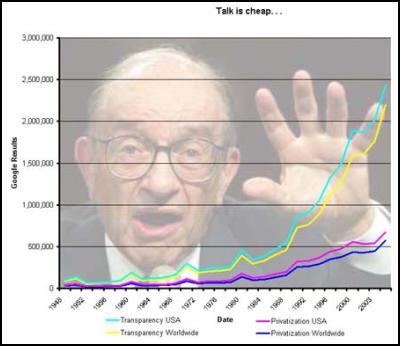
Frequency of usage of terms "transparency" and "privatisation"
in web-stored documents in Google universe. Contrast this with
the growth of US net foreign debt in the above chart...
- Image SandersResearch.Com The US currency is managed by the Board of Governors of the Federal Reserve System, itself comprised of twelve privately owned Federal Reserve Banks, including the Federal Reserve Bank of New York, which in turn serves as depository for the US government bank accounts. The member banks that own and control the individual Federal Reserve Banks have received extraordinary credit and information subsidies through the governmental apparatus.
If you review a list of the leading banks in the Federal Reserve System that are involved as depositories, trustees, servicers or securities dealers in the US agencies missing more than $3.8 trillion:
It's the same banks whose names appear in allegations of gold market manipulations.[17]
It's the same banks whose engineered Enron offshore deals.[18]
It's the same banks implicated in 9/11 profiteering.[19]
It's the same banks implicated by the big narcotics and arms trafficking and money laundering allegations.[20] .
It's the same banks implicated directly or indirectly in the “pump and dump” and naked short selling stock market schemes.[21]
It's the same banks implicated in black budget government contracting and collateral schemes and the fraudulent asset stripping of our great manufacturing enterprises.[22]
It's the same banks that are managing the huge derivative positions that are increasingly used to manipulate markets and drive monetary and fiscal policy.[23]
It's the same banks whose senior management, attorneys and accountants cycle in and out of the top government jobs at the agencies missing $3.8 trillion.[24]
It's the same banks that tell you that small business loans are not good business.
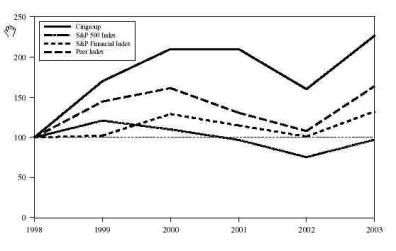
Click for big version
Cui Bono? - Was the 9/11 response good for Citicorp's investors?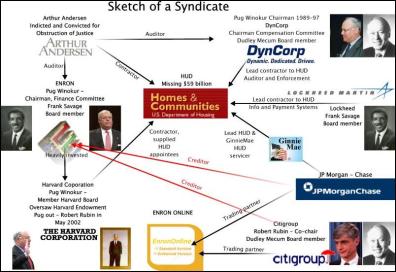
Click for big version
Sketch Of A Syndicate
- Image SandersResearch.Com Banking Over Lunch
In 1993, in an attempt to obtain a small business loan for my business, I had lunch with the head of corporate lending in the DC area from a large multinational bank. He explained that his bank had no plans to make small business loans of any meaningful volume in the District of Columbia.
I had checked the bank’s latest SEC filings that morning. It had approximately $110 billion in long Treasury bonds on its balance sheet.
Essentially, the American taxpayers were providing this bank with the mechanism to borrow short term at a low price using the credit of the American people through federal deposit insurance, and then use those funds together with our deposits to lend those very same funds to our government long term at a 550 basis point spread.[25] The bank had a recourse guarantee of our taxpayer credit by investing in US Treasury securities which are guaranteed by the full faith and credit of the US government, and refused to lend to my small business because it was not good enough business for the bank.
I estimated that this particular bank would reap $6 billion in risk free profit that year alone by inserting itself as an unnecessary intermediary -- between businesses and individuals as depositors and guarantors, and the very same businesses and individuals in their capacities as US taxpayers financing the US Treasury “deficit.” The net result was that my taxes were financing my government “funneling” billions of dollars in back door profits to large banks, while I and my fellow citizens who were backstopping the FDIC and US Treasury credit that made it all possible were forced to go elsewhere to finance our small businesses.
To add insult to injury, government leaders such as Bob Rubin (former Treasury Secretary now co-head of CitiGroup) and Franklin Raines (former Director of the Office of Management and Budget and now Chairman of Fannie Mae) have explained that the government could not afford to finance parks, roads and schools because, instead we needed to pay the interest on the growing national debt. In fact, the “national debt” argument was a ruse. The actual intended use for American taxpayers’ hard earned money dedicated, nominally, to “reducing the national debt” was the financing of billions dollars of back-door, rigged subsidies to banks and mortgage market players who have made Rubin and Raines so rich.
And why should your children have to sign up for military service just so they can pay off their student loans, while at the same time $3.8 trillion is missing from the US government? Why can’t your children's educations be financed by our tax dollars? Investing in education is the best thing we can do for our economy. Indeed, Peter Drucker notes that the GI Bill was perhaps the most profitable taxpayer investment of the 20th century. Why should you lose your home or small farm to foreclosure by the banks that are complicit in $3.8 trillion missing from the federal government? Are you earning 2% on your bank certificate of deposit while your neighbors are paying interest at 18% to Citibank or the IRS?
At the Top of My List
Here is the "Dirty Dozen Plus" list of primarily US-based banks and financial institutions that I would immediately withdraw my support from based on personal knowledge and experience:
- American Insurance Group
- Bank of America
- Bank of New York
- BBT
- Citibank/Citigroup
- Credit Suisse First Boston
- Deutsche Bank
- FleetBoston
- General Electric
- Goldman Sachs
- HSBC Bank
- JP Morgan Chase
- Mellon Financial Corporation
- Merrill Lynch
- PNC
- SunTrust Banks
- Wachovia Bank
I would also check to see who the lead member banks are in my Federal Reserve District and include them on your list.[26]
If you have been complaining about corporate America overpowering our democracy, check and see if you are also doing business with one or more of these banks.
Who's Who on Outsourcing Our Jobs
I would also look at withdrawing support from those banks involved in outsourcing jobs to other countries while withdrawing financing for jobs in our communities. Enticed by significantly lower tax burdens and labor costs, as well as a free reign in labor exploitation, more and more companies are joining the bandwagon of job exports while supporting policies that prevent the creation of new jobs domestically.
On one hand, many Americans are losing their jobs and either have no means of income or support, or they settle for reemployment at wages insufficient to make ends meet. Their communities are suffering diminished quality of life from lower tax collections, higher crime rates, decreased health, low morale and the family and community problems that unemployment and underemployment cause.
On the other hand, their lucky neighbors who still enjoy nice incomes – often coming directly or indirectly from the profits of outsourcing -- promote the notion that such outsourcing is the natural flow of free markets optimizing economic performance. Alas, I wish it were true.
Analysis of the financial institutions that are the power behind the throne at the New York Federal Reserve and the US Treasury reveals a pattern of dirty tricks to: (1) stop policies that would permit the US work force to reengineer their skills;[27] (2) prevent the flow of equity capital to small business;[28] (3) subsidize themselves with insider trading and risk free federal credit profits; (4) maintain complicity in the trillions of dollars missing from the federal government;[29] and (5) prevent place based transparency of government budgets and credit activity that would reveal their complicity.
This is not free markets at work – this is the use of insider dealings, cronyism, undue influence, political favoritism based upon a corrupt campaign finance system, and misuse of the federal credit, not to mention black budget and covert operation activities, to profit from the destruction of free markets.[30]
Lou Dobbs at CNN has been keeping a list called “Exporting America” of companies that outsource US jobs abroad, including the following banks.[31] Here are the banks on the Dobbs' list:
- Bank of America
- Bank of New York
- Bank One
- Citigroup
- JP Morgan Chase
- Mellon Bank
- SunTrust Banks
- State Street
- Sovereign Bank
- Wachovia Bank
- Washington Mutual
If you have been complaining about outsourcing of US jobs and you are banking at one of these banks, you need to go into your bathroom and look in the mirror. That is the person who is financing the outsourcing of US jobs.
When You Steal From Me, It's Personal
Someday someone will calculate the true cost to our families, our communities, our collective spirit and our environment worldwide, inflicted by this negative ROI economy. In the meantime, we can assume that the cost is somewhere between significant and staggering. In other words, the cost to you personally, to me personally, to each of our families, is significant.
This first hit me several years ago when I was working in an official capacity for HUD (the US Department of Housing and Urban Development) and had experienced first hand the affects of fraud and corruption. A Congressional staff member told me, “HUD is being run as a criminal enterprise.” Indeed, in fiscal 1998 and 1999, $17 billion and $59 billion respectively were officially reported as missing from HUD.[32]
I realized then that I was banking at the same banks I believed to be intimately involved in running HUD’s extra curricular activities. I realized that my own banks and others that I had done business with were directly or indirectly costing me and my family a small fortune when I took into account my relationship with them as a citizen and taxpayer and their role as depositories and servicers for my government’s financial dealings.[33]
It seemed to me that the least I could do was to try to clean up my own money. I decided I would learn how to “vote” with my money in the marketplace with all my transactions, including purchases, investments and banking relationships. I would start by withdrawing my money from the banks that were running my government's bank account and securities operations in a corrupt manner at great expense to my family and me. I would shift my deposits to banks and companies that were trying to do something beneficial on Main Street.
I closed my accounts at Citibank and JP Morgan Chase and moved my bank deposits to a community bank in Tennessee.
If Acting With Your Conscience Isn’t Enough, Consider the Pricing
Since that time I have traveled around this and other countries speaking and networking with thousands of people. What I hear wherever I go is that we are voting in the marketplace as consumers for the very banks whose actions we say we detest.
How many times have I heard activists tell me that they cannot switch their bank accounts to well-managed local banks because their ATM fees would increase or their interest on savings would decrease? Apparently, we are prepared to finance and support a group of banks complicit in stealing $14,000 per American resident from the federal government so long as they kick back $25 a year to us in the form of saved ATM fees and incrementally higher interest rates. It's one thing to be apathetic and go with the convenient flow of dirty money. It's another thing entirely to fail to price your kickback at anything close to a free market level. If someone steals $14,000 from you and then kicks back $25, do you continue to support them? Apparently, the answer is “Yes.”
The day we understand the power of our opportunity to decentralize and “re-price” our banking business by taking it away from the Wall Street banks listed above, and banks like them, something magical can start on Main Street.
Care to Join Me in Switching Banks?
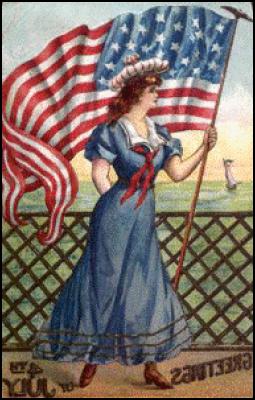
On July 4th, 2004, my colleagues and I are launching the Solari Circles Campaign. Initially, we are calling for 600,000 people worldwide to join us in closing our checking accounts, certificates of deposit, credit cards and other business out of the banks complicit in dirty money scandals and moving them to local, well-managed, community-friendly banks, savings and loans and credit unions.
Why 600,000? We estimate that 600,000 is 1% of 1% of our worldwide population. Since our financial system is highly leveraged, a relatively small shift (on the order of 1% of 1%) in customers from big banks to local financial institutions can cause a dramatic decentralization in political and economic power.
As a former partner and member of the board of directors at a major Wall Street investment bank and then Assistant Secretary of Housing in the first Bush Administration, I am amazed when people tell me that they feel helpless or that they have no power. I know from personal experience that we have significant power as consumers to impact the policies of financial institutions that exercise so much control over our government and communities. I know what can happen the minute even a small group of consumers starts "voting with our money" in the marketplace.
I also know that we can actually make money by “pushing the red button.” In financial terms, if we finance communities with equity while we bring transparency to government investment by place, and reengineer that investment to ensure optimal human and financial performance both by place and by function, we have the potential to bring the US economy back to a significantly more productive level.[34] In layman’s terms, if we shift our purchases, banking and investing to the local level, change how small businesses and farms get financed, and at the same time transform how government money is invested at the local level, we can transform from a negative to a positive return on investment economy.
That means we can pay off, convert to equity and eliminate or forgive significant amounts of debt and cleanse our system of governance of the dirty money that is pushing us towards warfare, environmental damage and a significant reduction in our Constitutional freedoms.
Let’s Start Now

Click for Solari Home PageWhatever your spiritual, moral or ethical practice, my colleagues in the Solari Action Network and I invite you to make a commitment to start now to “vote” with your bank deposits for the values that you wish to govern our world and to do so in a manner that enhances your personal financial security.
If you are a Buddhist, ask yourself, “Where would the Buddha bank?”
If you are a Muslim, ask yourself, “Where would Mohammad bank?”
If you are a Confucian, ask yourself, “Where would Confucius bank?”
If you practice Judaism, ask yourself, “Where would Moses bank?”
If you are a Christian, ask yourself, “Where would Jesus bank?”
Whatever your spiritual or ethical tradition, ask yourself where the person of the highest integrity in history would bank if he or she were alive today.
Then look in your wallet and in your checkbook and ask yourself if you have an opportunity to vote with your banking business to build a better world. A world that is in alignment with people, dolphins, trees, all other living things and the true best interests of small and large investors. A world that is safer and more prosperous for you and your family and your retirement savings.
Imagine the magical things that can happen when we take the time to understand and cleanse our own money. Imagine how magical things could be when enough of us tip the scale to the point that shareholders of JP Morgan Chase and Citibank start to insist that these banks should cleanse their money and operations to win back our business or the business of the companies we also pressure to switch? Indeed, feel free to buy a few shares of their stock so that you can go to their annual meetings and express yourself on these matters of vital interest to all of us. At Solari, we welcome any financial leader to join us in devising ways to generate new profits and capital gains with clean money and honest values. We invite JP Morgan Chase and Citibank to participate in a new way of doing business. We will continue to encourage global depositors to withdraw their accounts until we have created rich incentives for them to do so.
Until that time, we look forward to the energy that can be created on Main Street when the honest bankers and credit union leadership and their investors and supporters who have been struggling to attract our business can start to enjoy the fresh new resources that come their way as we shift our deposits and our attention. Imagine their delight at having the resources they need to revitalize struggling small businesses and incubate new startups.[35] Can you imagine what happens as we start to create a new generation of banking leaders who can make money from bringing some good old fashioned transparency, accountability and integrity to our financial system?
All those times that I have sat in the board room or at the highest levels of government arguing for the ethical solution, what I would have given to be able to say that the customers would back me up in the marketplace!
Is switching our banking business enough to fix all our problems? No. Are their many additional things we need to do? Yes. However, it all starts by incrementally switching our financial and market flows back into the hands of those we can trust. This will pave the way for migrating to digital gold or community currencies and other profitable initiatives in our area. Let's switch resources now to prime the pump and begin an honest conversation about all the opportunities that could be next.
If you believe that you have an opportunity to better reflect your values in how you transact your banking business, please join the Solari Circles Campaign at http://solari.com for some financial fireworks on July 4th and beyond as we embark on cleansing our economy, and our world, together!

For more on the Solari Circles Campaign
http://www.solari.com/campaign/july4th.htm
************FOOTNOTES
1. This article originates from the Christian tradition. We invite you to ask this question for Buddha, Mohammed, Moses or the spiritual presence most in your heart and to transform the intent into words that speak to you in your own traditions.
2. While the financial networks in and around the Vatican and related networks and societies such as the Jesuits and Opus Dei,are not known for financial transparency, starting points include stories related to Vatican banking scandals, including the laundering of Nazi monies and the Banco Ambrosiano scandals. See, Rupert Cornwell, “Sex, Fraud, Money Laundering: All Roads lead to Rome,” . and God’s Banker: The Life and Death of Roberto Calvi (New York: HarperCollins Publishers, July 6, 1984). The role of tax exempt endowments in the corruption of our markets and government has become increasingly illuminated with revelations about the role of the Harvard Endowment and its involvement in the Enron scandals, Russian money laundering, Harken-related insider trading and HUD fraud. See, “Negative ROI Economy, Articles and Documentation,” http://www.solari.com/gideon/articles_risk.html and, generally, articles published on the Harvard Watch website, available at http://www.harvardwatch.org.
3. For excellent examples describing organized crime spanning corporate, government and mafia networks, see European Union lawsuit against RJR Nabisco at http://www.scoop.co.nz/mason/stories/HL0211/S00167.htm, The Real Deal on Enron by Daniel Armstrong, http://www.scoop.co.nz/mason/stories/HL0304/S00031.htm and Kevin Phillip's book, American Dynasty
4. See, links on Dark Alliance and Mena allegations regarding government sponsored narcotics trafficking at the “Stanley Sporkin, Bio & Selected CIA Iran Contra Background,” http://www.solari.com/media/SporkinBio.html and bibliography at Catherine Austin Fitts, “Narco Dollars for Beginners,” The Narco News Bulletin,, available online at http://www.narconews.com/narcodollars1.html.
5. See, links at the “Stanley Sporkin, Bio & Selected CIA Iran Contra Background,” http://www.solari.com/media/SporkinBio.html and bibliography at Catherine Austin Fitts, “Narco Dollars for Beginners,” available at http://www.narconews.com/narcodollars1.html.
6. See, “A Negative Return on Investment Economy – Articles & Documents,” at http://www.solari.com/gideon/articles_risk.html.
7. See, “Transcript of Interview of Greg Palast, Journalist for BBC and Observer, London, “Alex Jones Radio Show (March 4, 2002), available at http://www.solari.com/gideon/privatization030402.html, and Catherine Austin Fitts, “The Myth of the Rule of Law,” available online at http://www.solari.com/gideon/articles/q301.pdf.
8. See, Chris Sanders, “Where is the Collateral?”republished from Scoop Media (October 28, 2003), available at http://www.whereisthemoney.org/S00223_collateral.htm.
9. See, Chris Sanders “Independence Day Special -- So, Where is the Collateral?”(July 5, 2004) available online at http://www.sandersresearch.com.
10. See, “Transcript of Interview of Greg Palast, Journalist for BBC and Observer, London, “Alex Jones Radio Show (March 4, 2002), available at http://www.solari.com/gideon/privatization030402.html
11. See, Kelly O'Meara, “Looting Russia's Free Market,” Insight Magazine Online, http://www.insightmag.com/main.cfm?include=detail&storyid=260507 .
12. See, Stephen F. Cohen, Failed Crusade: America and the Tragedy of Post-Communist Russia, (New York: W.W. Norton & Company, 2001 (2nd ed.)).
13. See, Catherine Austin Fitts, “The Promis-Like Profits of the Harvard Endowment,” Scoop Media (July 23, 2002) athttp://www.scoop.co.nz/mason/archive/scoop/stories/b1/51/2002… .
14. See, Catherine Austin Fitts, “CSC DynCorp and the Economics of Lawlessness,” available at http://www.scoop.co.nz/mason/stories/HL0304/S00158.htm
15. See, Catherine Austin Fitts, “Where is the Money?” available at Http://whereisthemoney.org, “Missing Money Articles and Documents” at http://www.solari.com/learn/missingmoney.htm and “NASA Missing $565 Billion,” at http://www.solariactionnetwork.com/phpBB2/viewtopic.php?t=1167 .
16. See, Kelly O'Meara, “Treasury Checks and Unbalances,” Insight On the News, (Posted April 14, 2004) at http://www.insightmag.com/news/2004/04/27/National/Treasury.Checks.And.Unbalances-658744.shtml.
17. See, generally, the website of the Gold Anti-Trust Action Committee at http://www.gata.org.
18. See, “Enron suit implicates nine US banks,” BBC News (April 8, 2002) available at http://news.bbc.co.uk/1/hi/business/1917627.stm and Daniel Armstrong, “The Real Deal About Enron – An Interview with Catherine Austin Fitts,” Scoop Media, available at http://www.scoop.co.nz/mason/stories/HL0304/S00031.htm
19. See, Catherine Austin Fitts, “An Open Letter to Jerry Hawke, Comptroller of the Currency United States Treasury” Scoop Media (June 9, 2004) available at http://www.scoop.co.nz/mason/stories/HL0406/S00083.htm and “Cui Bono 9/11” Scoop Media (June 4, 2004) http://www.scoop.co.nz/mason/archive/scoop/stories/51/f6/200406042049.5f158db0.html and John Crudele, “Fed Fudged Accounting After 9/11, Says Bank Big,” New York Post Online Edition (May 27, 2004) at http://nypost.com/business/21675.htm
20. See, Al Giordano, “CitiGroup's Rubin – Banking on Terror,” Narco News 2001 (October 15, 2001) available at a href= http://www.narconews.com/whitecollarterror1.html > http://www.narconews.com/whitecollarterror1.html and bibliography at Catherine Austin Fitts, “Narco Dollars for Beginners,” Narco News 2001 (October 24, 2001), at http://www.narconews.com/narcodollars1.html
21. For the magnitude of current levels of stock manipulation fraud, see the Stanford Securities Class Action database at http://securities.stanford.edu/filings.html
22. See, Catherine Austin Fitts, “Piracy on the Delaware,” Scoop Media (May 20, 2004), available at http://www.scoop.co.nz/mason/stories/HL0405/S00206.htm .
23. See, “Buffet Warns of Investment Time Bomb,” BBC News World Edition (March 4, 2003), available at http://news.bbc.co.uk/2/hi/business/2817995.stm .
24. See, William L. Watts, “Mastering the Capitol Universe, Goldman Sachs Alumni Make Their Mark in Washington,” CBS.MarketWatch, posted July 3, 2004, at http://www.solariactionnetwork.com/phpBB2/viewtopic.php?p=3311#3311 .
25. The difference between 2% and 7.5% is 550 basis points. So, in this example, the bank was raising money in the short-term maturity markets or in deposits using federal deposit insurance at a low interest rate and lending it back to the US government at a much higher rate.
26. See Links for the Federal Reserve Districts & Banks at http://www.federalreserve.gov/otherfrb.htm - you can call the public affairs office in the Federal Reserve Bank in your district and ask for a list of their top 10 member banks, or check with the American Bankers Association for the largest banks.
27. See, Catherine Austin Fitts, “The Story of Edgewood Technology Services,” available at http://www.scoop.co.nz/mason/stories/HL0207/S00101.htm .
28. See, Catherine Austin Fitts, “Litigation”, http://www.solari.com/gideon
29. See,[note italix] Catherine Austin Fitts, “The Myth of the Rule of Law,” available online athttp://www.solari.com/gideon/articles/q301.pdf.
30. See, Catherine Austin Fitts, “Black Budgets and the Manipulation of Markets,” available at http://www.financialsense.com/Experts/2004/AustinFitts.html and Chris Sanders and Catherine Austin Fitts, “Fascinating and Lucrative Patriotism, The negative return economy: a discourse on America’s black budget,” available at http://www.sandersresearch.com/Sanders/NewsManager/ShowNewsGen.aspx?NewsID=667.
31. See, the “Exporting America” link of the “Lou Dobbs Tonight” website at http://www.cnn.com/CNN/Programs/lou.dobbs.tonight/ .
32. See, Kelly O’Meara, “Why is $59 Billion Missing from HUD?,” Insight On The News (November 2000), available at http://www.insightmag.com/main.cfm?include=detail&storyid=208636 and “Cuomo leaves HUD in Shambles,” Insight On the News (March 5, 2001), available at , http://www.insightmag.com/main.cfm?include=detail&storyid=210881 and “Inside HUD's Financial Fiasco,” Insight On the News (June 25, 2001), available at http://www.insightmag.com/main.cfm?include=detail&storyid=161113
33. See, Catherine Austin Fitts, “The Myth of the Rule of Law: The Destruction of Hamilton Securities,” (November 2001),http://www.solari.com/gideon/articles/q301.pdf
34. See,[note italix] Catherine Austin Fitts, “Solari and the Rise of the Rule of Law,” available online at http://www.solari.com/solari.
35. See, Catherine Austin Fitts, “The Community Wizard of Sebastopol,” available at http://www.scoop.co.nz/mason/stories/HL0303/S00231.htm
************ Catherine Austin Fitts is the President of Solari, Inc., a member of the board of directors of 911Truth.org and of the advisory board of Sanders Research Associates. Ms. Fitts is the former Assistant Secretary of Housing-Federal Housing Commissioner during the first Bush Administration, a former managing director and member of the board of directors of Dillon Read & Co. Inc. and President of The Hamilton Securities Group, Inc.
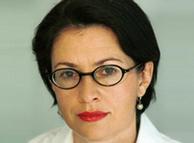 Bildunterschrift: Großansicht des Bildes mit der Bildunterschrift: Lochbihler expects more from Germany and the EU
Bildunterschrift: Großansicht des Bildes mit der Bildunterschrift: Lochbihler expects more from Germany and the EU 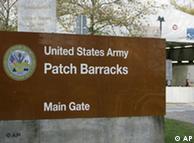 Bildunterschrift: Großansicht des Bildes mit der Bildunterschrift: The US Army Patch Barracks in Stuttgart-Vaihingen
Bildunterschrift: Großansicht des Bildes mit der Bildunterschrift: The US Army Patch Barracks in Stuttgart-Vaihingen 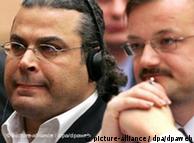 Bildunterschrift: Großansicht des Bildes mit der Bildunterschrift: El Masri (left) was kidnapped by CIA agents
Bildunterschrift: Großansicht des Bildes mit der Bildunterschrift: El Masri (left) was kidnapped by CIA agents 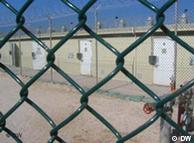








 Demographics: Tze Ming Mok Considers The Census
Demographics: Tze Ming Mok Considers The Census MOTORNET: Karl Ferguson Takes A Lexus For A Spin In The Rain
MOTORNET: Karl Ferguson Takes A Lexus For A Spin In The Rain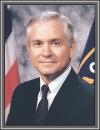 Iraq: America Reconsiders Its War And Its War Leadership
Iraq: America Reconsiders Its War And Its War Leadership American Coup: A Survey Of Evidence of 2006 Election Fraud
American Coup: A Survey Of Evidence of 2006 Election Fraud 

